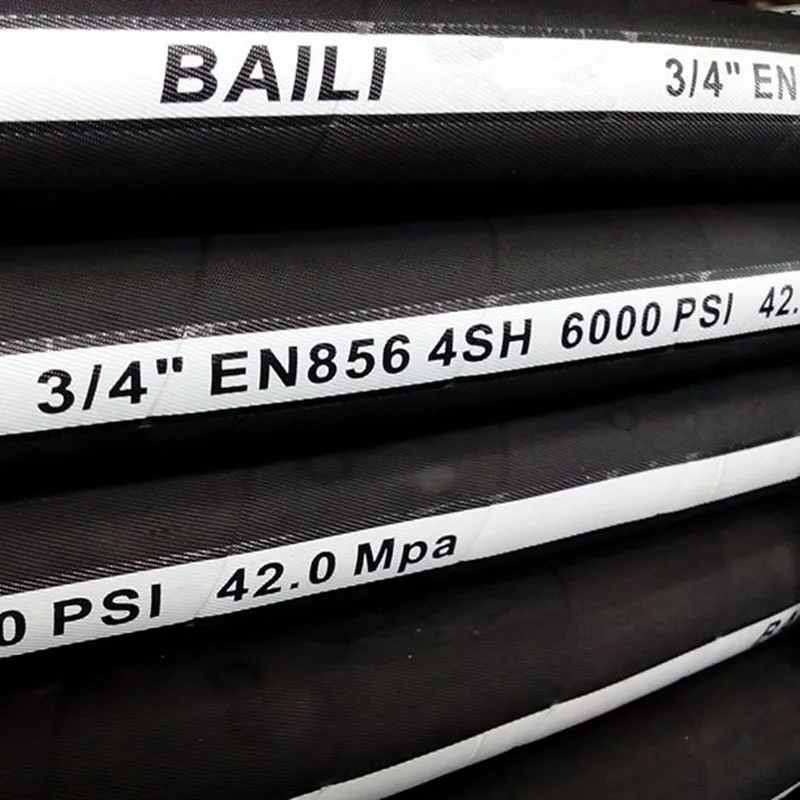Nov . 28, 2024 06:43 Back to list
Hydraulic Hose Manufacturers and Suppliers Compliant with SAE Standards and Specifications
Hydraulic Hose Companies An Overview of SAE Standards and Industry Leaders
Hydraulic hoses are vital components in various industries, serving as conduits for transmitting fluid under pressure in hydraulic systems. The Society of Automotive Engineers (SAE) sets standards for these hoses to ensure safety, reliability, and performance. Understanding these standards and knowing the key companies in this sector can help in making informed choices when selecting hydraulic hoses for specific applications.
Understanding SAE Standards
The SAE has established a comprehensive set of standards that govern the dimensions, materials, and performance criteria for hydraulic hoses. These standards, such as SAE J517, provide guidelines for the construction and testing of hydraulic hoses, which are essential for industrial machinery, automotive applications, and aerospace technologies. The SAE classification system includes several types of hoses, such as SAE 100R1, R2, and R5, each suited for different pressure ratings and types of fluids.
For instance, the SAE 100R1 hose is designed for low-pressure applications, featuring one steel wire braid reinforcement, while the SAE 100R2 hose is engineered for higher-pressure applications with two layers of reinforcement. Understanding these specifications is crucial for engineers and procurement specialists in selecting the right hose for their needs.
Key Players in the Hydraulic Hose Market
Several prominent companies manufacture hydraulic hoses that comply with SAE standards. These players have established themselves as leaders in the industry through innovation, quality, and customer service. Here are a few of the top companies
1. Parker Hannifin Corporation Founded in 1917, Parker Hannifin has become one of the leading manufacturers of motion and control technologies. Their extensive line of hydraulic hoses includes various types, such as spiral and wire-braided hoses, catering to a wide range of applications. Parker is known for its commitment to quality and innovations that enhance performance and safety in hydraulic systems.
sae hydraulic hose companies

2. Eaton Corporation Eaton is another major player in the hydraulic hose market, offering a diverse line of products designed for durability and efficiency. Their hydraulic hoses comply with SAE standards and are used across industries, from agriculture to aerospace. Eaton's advanced technologies focus on reducing downtime and increasing system reliability.
3. Gates Corporation Gates is renowned for its expertise in power transmission and fluid power solutions. With a robust selection of hydraulic hoses that meet SAE certifications, Gates emphasizes performance and longevity in their products. Their innovations, such as the MegaSys line, have revolutionized the way hydraulic hoses are designed, providing enhanced flexibility and resistance to wear.
4. Continental AG A leading rubber and polymers manufacturer, Continental has a substantial presence in the hydraulic hose industry. They combine advanced materials with cutting-edge manufacturing techniques to produce hoses that meet stringent SAE standards. Continental is recognized for its commitment to sustainability and developing eco-friendly hose solutions.
5. Goodyear Rubber Products Goodyear is an established name in various sectors, including hydraulic components. Their product line includes hydraulic hoses designed for high performance and safety, with compliance to SAE standards. Goodyear focuses on delivering reliable solutions for industries where safety is paramount.
Conclusion
Selecting the right hydraulic hose is essential for the efficient and safe operation of hydraulic systems. By adhering to SAE standards, manufacturers ensure that their hoses meet necessary performance and safety criteria. As companies like Parker Hannifin, Eaton, Gates, Continental, and Goodyear lead the market, they continue to innovate, offering high-quality products that cater to various industrial needs.
Understanding the benefits of using SAE-compliant hydraulic hoses and recognizing industry leaders can empower businesses to make educated decisions. As industries evolve and demand increases, staying informed about advancements in hydraulic technology will remain crucial for maintaining operational efficiency and safety.
-
High-Quality OEM/Custom PTFE/Teflon Hose Factory in China
NewsJun.01,2025
-
Low Pressure Flexible Hydraulic Hose Durable & Affordable Steel Braid
NewsJun.01,2025
-
1 Inch ID Rubber Hose High-Pressure & Chemical Resistant
NewsMay.31,2025
-
High-Pressure 1/4" Hydraulic Hose Lines R5 Rubber, Durable & Flexible
NewsMay.31,2025
-
1SN Hydraulic Hose High Pressure, Steel Wire Braid Durability
NewsMay.31,2025
-
Smooth Cover Hydraulic Hose Supplier OEM Export Solutions
NewsMay.31,2025
